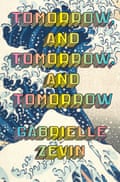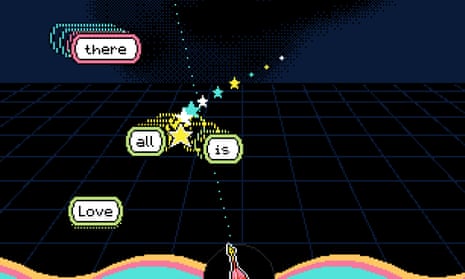Ever wanted to play a computer game based on the poems of Emily Dickinson? Well, now you can, with the release of EmilyBlaster, a 1980s-style game in which players must shoot words out of the sky to correctly recreate Dickinson’s verse.
EmilyBlaster is a real-life version of the fictional game that a character makes in Gabrielle Zevin’s novel Tomorrow, and Tomorrow, and Tomorrow, out next month. Zevin’s book is about Sadie and Sam, who first meet as children in a hospital computer room in 1987. Eight years later, they are reunited and begin to work together making computer games.
Among the first games Sadie makes is EmilyBlaster, and now readers can play along, after the book’s US publisher, Knopf, recreated it to celebrate Tomorrow, and Tomorrow, and Tomorrow’s publication.
There are three levels to the game, each with a different poetry extract: level one is from That Love is all there is, level two is from We talked as Girls do, and level three is from Hope is the thing with feathers.
In the novel, Sadie makes EmilyBlaster “out of desperation and with almost no time left”: “Poetic fragments fell from the top of the screen and, using a quill that shot ink as it tracked along the bottom of the screen, the player had to shoot the fragments that added up to one of Emily Dickinson’s poems,” Zevin explains in the novel. “And then once the player had successfully cleared the level by shooting several of Emily’s verses, you earned points to decorate a room in Emily’s Amherst house.”

Readers are told that Sadie’s class hated it, with one student saying she “thought some of the graphics were nice, but the thing is, the game kind of sucked”.
Zevin told LitHub that as well as Dickinson’s poetry, the game was inspired by “edutainment games of the 1980s”.
“I liked the slight subversiveness of making a game where the object was to shoot poetry, and I thought that Emily Dickinson’s compact verse style and memorable phrasings would make for perfect targets,” she said.

Zevin described EmilyBlaster as “a little bit addictive and the right amount hard”.
It’s the first time the book’s UK publisher Vintage has launched a computer game based on a game within a book. The publisher has created a website where people can play EmilyBlaster and create their own 80s-style computer game avatar. And when Zevin tours the UK in July, it will install an arcade machine in full book-jacket garb, also equipped with Donkey Kong, in Waterstones Piccadilly in London for a week.
Zevin is the author of several novels including The Storied Life of AJ Fikry, which is being made into a film starring Lucy Hale, Kunal Nayyar, Christina Hendricks and David Arquette. She has also written books for children, including Elsewhere, which won the Sheffield children’s book prize for longer novels and the Stockport Schools’ book award, and was longlisted for the Carnegie medal.
Although this particular kind of game, based on one within a book, is not that common, there have been multiple games based on books. Successful titles include The Witcher series and Tom Clancy’s Rainbow Six Siege, both of which began life as books. In 2020, the Orwell Estate endorsed Orwell’s Animal Farm, based on George Orwell’s 1945 novel, in which players can assign tasks, manage resources and determine which animals make sacrifices and which would be “more equal than others”.
And just released is We Are Not All Alone Unhappy, a short interactive game in which players are asked to create a pairing between two characters who received canonically unhappy endings in Shakespeare’s plays.

Comments (…)
Sign in or create your Guardian account to join the discussion